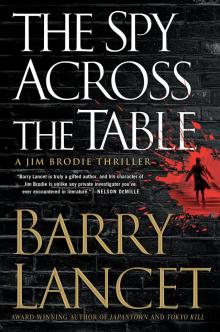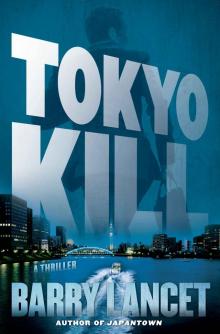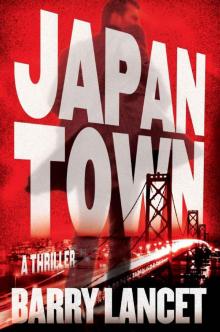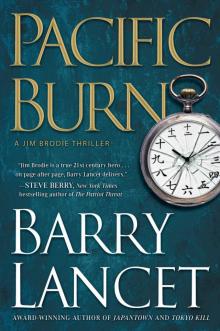- Home
- Barry Lancet
Tokyo Kill Page 13
Tokyo Kill Read online
Page 13
I said, “So we heard. You have an interesting group.”
Danny shrugged, volunteering nothing.
I said, “Our escort said some curious things.”
Danny raised an eyebrow. “Such as?”
“That the association would do anything to protect your uncle.”
“True enough.”
“He called him ‘the Chang family Ti Zang.’ ”
The skin around Danny’s eyes crinkled with the dry amusement of a hundred generations. “It is a fitting title, I think.”
“What is he? A monk?”
“No. Ti Zang is the protector of children and suffering souls. He speaks for those who have no voice.”
I said, “A religious leader? A pilgrim?”
“Not a leader like you mean. Maybe a pilgrim of life. Like a living Buddha. He is nothing and everything and he is holy.”
“I see.”
Danny’s skin crinkled again. “I think you do.”
Rie stiffened. “Danny, your men poisoned us.”
“Just Brodie.” He flicked his cigarette butt at a patch of weeds and shoved his hands in his pants. “There is much at stake.”
Rie’s expression was stern. “Some of your men look, well, shady.”
“The family association pulls together, but people have different talents, Rie. And we have to let them do their jobs the way they know how. The Changs gain only widows when we grow careless.”
“But poison?”
“After you talk to Uncle, you’ll see why we’re so careful. Of course, had your friend here pulled anything, he’d be dead.”
“Danny!”
“Sorry, Rie, those are the rules around Uncle. Over the years some people have come after him, and others sent small armies.”
I said, “So what was in the antidote? Our guide looked distinctly unhappy when I drank it.”
Danny grinned. “Lester? I can imagine.”
Rie said, “Why?”
“We don’t know Mr. Brodie. Only you.”
“And Lester Chang’s role?”
Danny cleared his throat behind a tight fist. “Should things have gone sour, he was granted certain concessions in return for performing the rather tricky task of disposal.”
“What kind of concessions?”
“Nothing really.”
Rie said, “We are not moving from this spot, Danny Chang, until you answer my question.”
Danny lit another Dunhill, inhaled deeply, and stared at Rie, exhaling smoke with a sigh. “Lester was pouting, wasn’t he? Always does when things go well.” He took another long pull of his cigarette. “In exchange for disposing of a traitor’s body, he has harvest rights.”
“What do you mean?”
“Body organs.”
“Danny!”
He gave another shrug. “Big black market. Transplants, elixirs, delicacies for connoisseurs. What can I say, Rie? Compromises must be made.”
“You could have started by putting a little more faith in us.”
“Procedure was set long ago. Besides, it’s a time-honored Chinese tradition.”
“What tradition is that?” Rie demanded with constabulary disapproval.
Danny grinned. “Waste not, want not.”
“Go ahead and laugh, but your Lester Chang looked like he might take matters into his own hands.”
Rie’s eyes flung daggers, and I wondered if she was taking out some of her frustration with me on Danny.
His grin vanished and he grew deadly serious. “The Chang Family Association is honorable when it gives its word. So are the Changs, and all are Changs today. Now, shall we stop arguing over procedure and go see Uncle? He will be waiting.”
CHAPTER 39
WE called them Black Wind. No one meet them and live. Except me.”
“I’ve never heard of them.”
Uncle Chang turned world-weary brown eyes in my direction. He had a full head of silver hair and a triangular face with dark sacks under the eyes. “You say some men attack you?”
“Yes.”
“How?”
I told him about Hamada’s severed head with my picture, and the raid on the ferry. Then I backtracked to the home invasions and Yoji’s murder. I skipped over the death of the third man in Miura’s troop since I had almost no information on it. Last, I mentioned that the meat cleaver used to hack off Hamada’s head looked to be the same instrument employed to remove Yoji’s arm, according to the latest police update. This was courtesy of Rie on the ride over, in a very terse report.
Old Chang absorbed my disclosures without expression, his eyes probing in a manner older than the ages.
* * *
His look had been cryptic from the start.
Danny had led us up the set of decaying stairs to a hilltop crowded with Chinese tombstones.
Behind a brick temple with vermilion doors, I saw the mausoleum, home to the “patient dead.” Years ago, a coffin ship would transport the deceased back to the motherland. The custom ground to a halt when Mao closed China. The caskets of homesick expats piled up. I wondered if they still waited.
“This is Uncle Chang,” Danny had said.
The mysterious man we’d come to meet sat on a cemetery bench. He wore a gray knit shirt and a threadbare navy blazer with a rolled Chinese newspaper stuffed into a side pocket. He’d plunged right in with the Black Wind.
Now he asked, “The killers came at night?”
“All except the ferry attack.”
“With chopping weapons?”
“Mostly.”
Uncle Chang closed his eyes and placed his hands on his knees. His breathing slowed. I sent a questioning look at Danny, but his gaze was fixed on the family Ti Zang.
A minute passed. Then another. Chang opened his eyes, reached for a pack of Guangdong cigarettes on the bench next to his leg, and lit up.
“What you think, Brodie-san?” he asked, exhaling the question with a blast of blue-gray smoke.
“Everyone thinks they’re Triads.”
“What you think?”
From a distance they looked Japanese but didn’t. A bit closer and they looked Chinese but didn’t.
“I want to believe we’re dealing with Triads because it gives us a clear target, but I’m not convinced. And one of my sources insists it’s not Triads.”
Chang nodded in appreciation. “You found clever source.”
“So you know who they are?”
“I know who they aren’t,” he said, his gaze shifting to a middle-aged Chinese couple emerging at the head of the stairway.
They bowed to Uncle Chang and headed toward the graveyard. The man, in a worn yellow windbreaker and a sagging undershirt, carried a watering can. The woman cradled a bouquet of flowers wrapped in newsprint. A pale blue summer dress hung on her thin frame.
“Many of my friends rest their bones on this hilltop,” Uncle Chang told me.
I nodded.
“We inhabit this country for a safe life,” he continued, “but we never forget our homeland. China is like tired mother who takes bad lovers and has no time for her children. We can return to her only after time passes and her latest lover has gone away. Ming Dynasty, Qing Dynasty, Nationalists, Japanese Imperial army, Communists, Mao’s Cultural Revolution, capitalistic Communists—they are all bad lovers. We Chinese worship our country, but we are unlucky in our governments.”
“I’d say so.”
Chang’s eyes followed the couple as they wove through the tombstones. “This is fine spot for visit to my friends, don’t you think?”
“Yes,” I said carefully, “pleasant.”
Chang exhaled a thin stream of smoke. “Good. You are serious man. Your ears are open to listen. So I tell you story.”
“I would be honored.”
“It is not pleasant story.”
“I’ve seen my share of unpleasant in the last few days.”
“Then I pray your recent troubles have prepared you.”
CHAPTER 40
<
br /> I WAS born in a village so small the mapmakers turned their faces away.
“Like my father, I became a traditional herb doctor. Fourth generation in our family. We traveled over countryside filled with Chinese farmers working Chinese soil and grazing Chinese pigs and sheep and cows. We owned horse for pulling our cart. This was great good fortune. Other peoples have only donkeys. Most have no animal and when they plow their field they are donkey.
“Father and I visit sick peoples all over northern Manchuria, getting our payment sometimes in coin but mostly in chickens and goats and rice and sorghum. Sometimes people have no money or food to pay so we give them some chickens and goats and grain off our cart. My father was generous man, and honest. You would know this because our house was modest and my father had no concubines. Also, he was clever man. His cleverness save my life.
“In our house we have no rich decoration like other doctors. No Western furnitures, no velvet curtains, no Chinese carpets from big city. ‘Don’t breed envy in others,’ my father say. His money went in ‘garden-bank,’ a steel box set in our backyard under large gray stone.
“ ‘After big good luck follow big unluck,’ my father teach us. ‘Safety first, then luxury, but only small luxury.’ I listen well to my father’s speakings. At seventeen I marry. My fifteen-year-old wife pick out one silk dress so she can feel her beauty. Her selection is green with lucky dragon-scale pattern and she is delicate and lovely in it. We bury our money in garden-bank. We are happy, and the wise gods fill our needs. One day, just like my father tell us, unluckiness arrive in our village, and it is unstoppable.
“With money from garden-bank I escape to Japan. Now I live in Yokohama in small China.”
Not entirely convinced the conversation was headed in a useful direction, I said, “So there or here you met the people who might have committed the home invasions?”
Uncle Chang shot a plume of cigarette smoke skyward. “I know style of groups who attack me over many years, so I show where you find answer.”
“Fair enough. Do you know an Akira Miura by any chance, from the old days back in China?” I pointed Miura out in a photograph I’d liberated from his home.
Chang squinted at the picture. “He look like lead army man in next big town.”
“If you know him, maybe you know a Wu? He was a doctor like you.”
Uncle Chang grew still. Danny turned pale. The next instant two armed men emerged from behind the mausoleum, guns leveled our way.
Rie shot me a fearful glance.
The gunmen inched closer.
“What is it, Danny?” Rie whispered.
Uncle Chang said, “I am doctor you seek. I am Wu.”
CHAPTER 41
HEARING one coincidence too many, I’d played a hunch.
Now a pair of thugs stood four yards away. Close enough to put a hole in me without effort. Far enough away so that I couldn’t get at them. I’d promised to come alone, and stuck to my word. Wu’s people hadn’t committed to anything.
Lester, our sour-faced escort, no doubt also a Wu, might get his wish after all.
* * *
Before I could stop her, Rie exploded. “So is anything you told me true, Danny?”
“Rie,” he said. “You have to understand. I—”
Uncle Wu jumped in. “All is true. Name change is for safety only.”
Rie shifted her wrath to the newly minted Wu. “Are there any other ‘true’ things for safety only?”
One of the gunnies panned his weapon in Rie’s direction.
Wu flushed. “Chang Family Association is Wu Family Association. We spread no more safety lies.”
Rie rolled her eyes. “And you, Danny Chang. My so-called friend. If this is really the Wu Family Association, what are you doing here?”
Danny cast a nervous glance at the triggermen. “Keep your voice down. They don’t understand Japanese and if they think you’re a threat . . .”
Rie’s eyes flared. “What? They’ll shoot me?”
“Rie, please. These guys—”
“Are what? Never mind. Just call them off.”
“Only Lester can do that.”
“I know I asked for your help, but why’d they let you in this far, Danny?”
Rie’s longtime Hong Kong friend pursed his lips. “My, um, mother’s maiden name is Wu.”
Rie closed her eyes. Her face reddened. First me, then Danny had dented her professional pride.
“Hear me out,” he said. “Around Uncle, danger is the byword. He has worked for years to help his people back home. He sends supplies. And literature. He speaks for those who have no voice. The party doesn’t like it. They send men. Some of them are killers.”
I laid a reassuring hand on Rie’s arm. “You really can’t blame them for being cautious. It was Brodie Security they were worried about, not you.”
“Exactly,” Danny said.
“Well, then,” Rie said, her professional calm reemerging, “we have questions. Lots of questions.”
“I understand. Let me have a quick word with Uncle.” After a hurried exchange in Chinese, Danny turned back to us. “Uncle is old-school. He wants to explain in his own way. Is that acceptable?”
We agreed. Not that we had much choice.
Danny punched a number in his cell phone, conducted a second rapid-fire exchange in Chinese, then disconnected. A phone on the lead shooter’s hip buzzed. Flashing a warning look in my direction, he scanned a text message, then slipped the gun centered on my chest into the back of his waistband. Both men disappeared once more behind the mausoleum.
Wu’s gaze swept from the tombstones to us.
His brow had darkened.
CHAPTER 42
NOBODY know why seven Yang family members wake up dead,” the Wu patriarch began in a subdued voice, “but whole village was terrified.”
My thoughts ran immediately to the home invasions.
“Very very big unluck. Old Yang was village head for years. Japanese army announce plague kill Yangs so everything must be burned. All of village gather to watch towering orange flames eat three generations of Yangs.
“But death visited our village even earlier. Every month traveling vendors come for big market day. Summer cottons and fine silks are colors of yellow and green and red. Good-luck charms from famous temples glitter in morning sun. In bamboo cages there are fatted brown ducks and rabbits. You can find turtle eggs and dried jellyfish and fresh-picked mushrooms. Spirit-mediums wearing dark turbans of mountain peoples talk with ghost-spirits of departed loved ones.
“One market day Japanese platoon marched into our village and kill first two peoples they find. The soldiers send five bullets to Hatless Yu, who repair carts and dig irrigation ditches. They stab their bayonets into Great-Grandmother Sweet-Fists Liu. She would ball up her hands into fat red fists and when she open them village children always find sweets inside.
“With these twin deaths Japanese army tame my village. We are near big highway into North Manchuria. Our rich farmland yields many kilos of rice and sorghum and vegetable. Japanese take all for their troop. The army reach their hands everywhere. Crops, livestock, and store supplies disappear. They raid homes and grab mini gold bars and every valuable. Our village become poor overnight.
“The soldiers were short and mean-eyed. We hear other Chinese call them wogou, ‘dwarf bandits,’ and we now understand why. But they are worse than their name. They take over village office. They take over farm policy bureau. They take over police station. Into our schoolhouse come Japanese teachers. They force Chinese teachers to wash floors on their hands and knees and kick them in front of Chinese children to prove Chinese learning has no worth.
“Number Two man in village before unlucky Village Head Yang wake up dead is Xeng Shinyin. Xeng has only one child. Her oval face and wide lemon-shape eyes are famous in our region. She is Once in Thousand Moons Treasure. Xeng push her to study most polite Japanese phrases in new schoolbooks, and when we have arrival of important dwarf ba
ndit she sing Japanese song at welcome ceremony. Two weeks later traditional matchmaker arrive from faraway big city. A month following, a grand marriage is celebrated. They carry Xeng’s daughter away to new Japanese husband’s house in big city. It is the finest ceremony in our village history, with famous Chinese musicians and wedding sedan of most expensive red silks. Two months later when Yang family wake up dead, Number Two Xeng become Number One Xeng.
“Our tiny village rejoice about big marriage. It must bring big good luck, we believe. But we are wrong. Dwarf bandits take even more and soon we have only gruel. We crush boiled leaves into it for flavor and nourishment. We get thinner and thinner and my patients catch many diseases. I am busy all day and many nights. Only New Village Head Xeng grow fat. He take two concubines and build big house with high walls and many fruit trees.
“Big bad luck had found us. And on fourth harvest Black Wind found me.”
CHAPTER 43
BLACK Wind men walk light and quiet. With them come Chinese collaborators who can speak dwarf-bandit language.
“Black Wind group pay respect to Japanese village head then charge into my home without bows or manners. Knowing I am traveling doctor, they show me a list of villages and ask me to guide them. In their faces I see dark clouds so I decline, saying my hands overflowing with sick peoples. One patient is there. The leader shoot him and ask me to introduce other sick peoples. Also my wife and child. I agree to lead them.
“We travel at night dressed in straw rain-capes and wide hats of Chinese peasant-farmers. In daytime we sleep in forests or hills. I listen to their stories. From years of travels I grew ears to absorb language because Chinese dialects are many. Two years before Black Wind come I already absorb dwarf-bandit tongue.
“That is how I find Japanese soldiers have only disdain in their hearts for us. We are dogs to them. Beneath hate and envy. How can you be jealous of dog? How can dog speak their language? They believe it impossible even though they have two Chinese traitors with them. But I never talk dwarf-bandit words to dwarf bandits. Too dangerous. My captors address me in simple Chinese and I answer in Chinese they can understand. Chinese traitors do not speak to me at all. I am dog to dwarf bandits but I am bug to them.

 The Spy Across the Table
The Spy Across the Table Tokyo Kill
Tokyo Kill Japantown
Japantown Pacific Burn
Pacific Burn